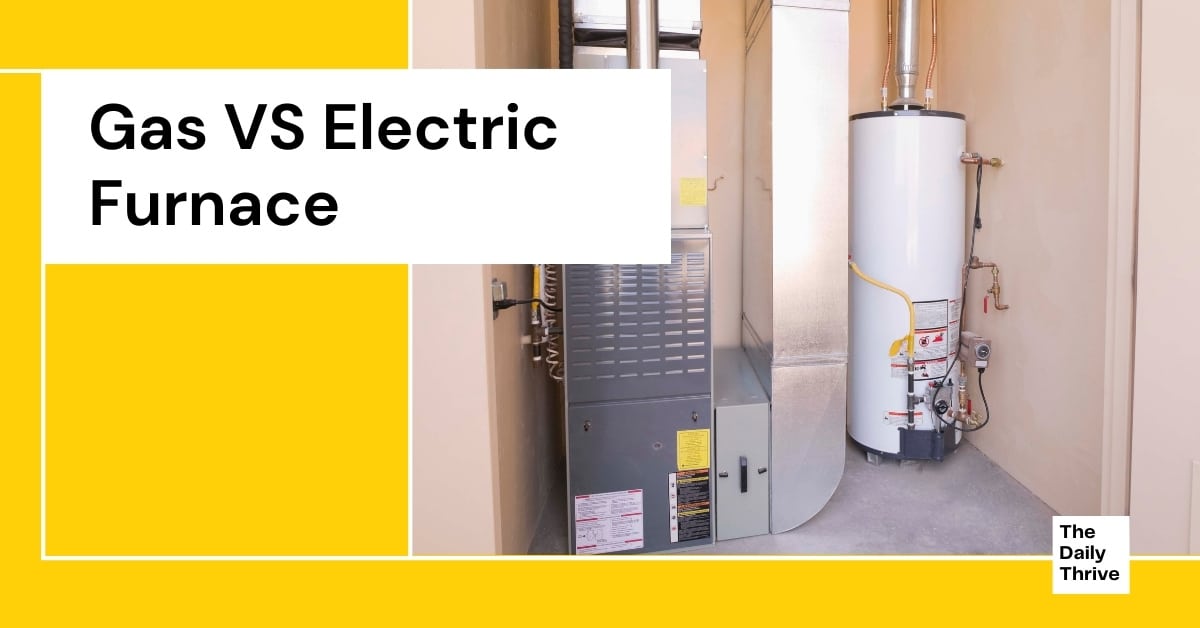The main difference between Gas vs Electric Furnace is the way they generate heat. Gas furnaces generate heat by combusting fuel, and electric furnaces produce heat using a heating element.
Every furnace models needs fuel. The earliest home furnace was a wood or coal-burning stove that would warm the entire home. The furnace likely uses either natural gas or electricity in today’s homes. Older homes may still have a propane heating system; most newer homes have been converted to natural gas or electric furnace.
Gas and electric furnaces use large blower fans to move heated air throughout your home. However, the similarities end there. The way they generate heat, the size, cost, and efficiency of both systems are different. Each has specific advantages and disadvantages designed to meet the demands of homes across the country.
Let us weigh the pros and cons based on factors one would consider.
Price: Money is a limited resource, and an average individual would always go for the cheapest contender that can still perform and deliver. Gas furnaces are generally more expensive to purchase. Operation cost would depend on gas and electricity prices in your area hence are almost up to par.
Heating: Gas furnaces provide more effective heating compared to electric ones. Aside from giving better heat, gas furnaces also heat up faster than electric ones. Gas furnaces are said to have 95% efficiency in using fuel to heat the system, something that the electric ones are far from achieving.
Longevity: In terms of longevity of service, gas furnaces will last longer than electric furnaces. A well-maintained electric furnace can live up to 30 years. Still, a gas furnace can have a lifespan twice of an electric furnace.
Safety: Safety varies largely in both types. Since gas furnaces can produce higher temperatures, they pose higher risks than their electric counterparts. The fact that there’s fuel combustion happening inside gas furnaces makes it dangerous.
Noise: If you are looking for a quiet heating system, electric furnaces are the best bet. Without fuel combustion, the fans will be the only thing audible.
Maintenance: Maintenance is something common to both types. However, gas furnaces require more frequent and regular maintenance to ensure safe and efficient operation. Maintenance costs would be higher with gas furnaces.
Gas Furnace Pros and Cons
How it works: A gas furnace kicks into action when the thermostat tells it that the room temperature has dropped below a preset comfort level. When this happens, the thermostat sends a signal to the furnace, which tells it to open a valve, deliver natural gas to the burners and turn on the blowers. This combination then creates hot air that pumps through the vents in the home and raises the temperature.
Pros of a Gas Furnace:
- Hotter: A gas furnace can heat the home higher than electricity. An electric furnace only has so many sets of heating coils. When they are all up and running, that’s the best it can do.
- Faster: A flame is instantly hot, whereas electric coils may take time to heat up. Because it distributes heat as soon as you turn it on, it warms up the home faster than an electric furnace.
- Energy Efficient: A gas furnace will use less energy to heat the same amount of space. Natural gas also costs less than electricity, making this option more economical, particularly in areas that have freezing temperatures throughout the year.
Cons of a Gas Furnace
- Availability: If you don’t have natural gas lines in your area, it can be costly or even impossible to have them installed.
- Price: The cost of a gas furnace is higher than an equivalent electric model. This initial purchase price can be a deterrent, especially if your furnace just went out and you’re not prepared for a big home expense.
- Risk: There is an elevated risk of having a gas furnace in your home. You must have carbon monoxide detectors installed. The risk of accidental fires or explosions may increase if the furnace is not properly handled.
- Installation and Maintenance: Because of the increased risks with a gas furnace, it’s best to have it installed and maintained by a professional. This can add to the overall cost of ownership.
Where they work best: If you already have a natural gas line to your home, you’re better off installing a natural gas heating system. The elements are already there, and your month to month costs will stay low.
Electric Furnace Pros and Cons
How it Works: There is no burner or combustion chamber in an electric furnace. Instead, several sets of heating coils burn hot when an electrical current runs through them. Blower fans distribute the heat throughout the home. When you turn up the thermostat, another set of coils will heat up, creating more heat in your home.
Pros of an Electric Furnace
- Safety: Electric furnaces tend to be a safer option because it does not give off carbon dioxide, and there’s no combustible gas involved.
- Size: Electric furnaces tend to be smaller in size. This gives you more placement options without taking up valuable space in your home.
- Durability: If maintained well, an electric furnace can be more durable than gas furnaces lasting up to 15 years. Because they are easy to maintain, this makes them more affordable in the long run.
- Price: Electric furnaces are cheaper than gas systems. There is a wide range of options on the market in the budget-friendly price range.
- Installation: An electric furnace is smaller and easier to install. There are not a lot of prerequisites like a gas furnace requires.
Cons of an Electric Furnace
- Running Cost: While they may be more affordable over time, month to month electric costs are higher to run.
- Time: It takes time for an electric furnace to kick on, heat the coils, and blow hot air throughout the home. This means it takes longer to heat your house every day.
- Efficiency: If you live in a freezing part of the country, your electric furnace will have to strain to keep up with the demand for heat.
Where they work best: An electric furnace works best in areas that don’t need high heating power. They are common in the northeast and south regions, where electricity is cheaper or more readily available than natural gas.
Conclusion
Your home is your haven, and it should be a place of refuge and comfort all year long. Deciding how to heat and cool your home should depend on your home’s individual needs.
If you live in an area with existing natural gas lines, a conventional HVAC system is a way to go. It combines your heating, air conditioning, stove, and water heater into one energy source. Natural gas is clean, inexpensive, and efficient.
However, suppose you live in an area where natural gas is far more expensive or not available. In that case, an electric system can heat your home to a comfortable level all year long. Heat pumps are also growing in popularity as an alternative or addition to a typical electric or gas furnace.
No matter what heat source you use, energy costs more than any other system in your home and makes up almost half of our utility bills. Always maintain and upgrade your equipment on time to keep running costs low.
By combining proper equipment, regular maintenance, and recommended upgrades, you can create substantial savings on your bills and create a comfortable home environment for your family. If you are still not sure if gas vs electric furnace is the way to go, get quotes from your local HVAC dealer, they will be glad to help.






